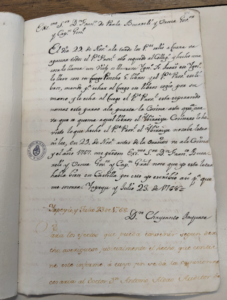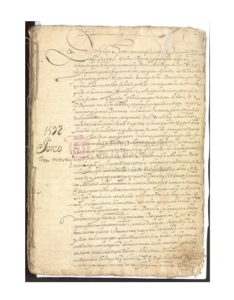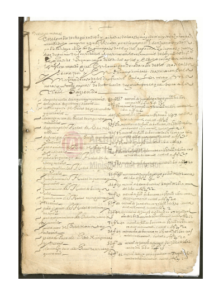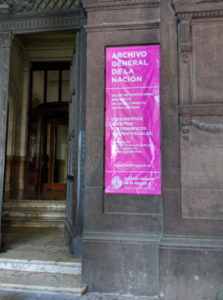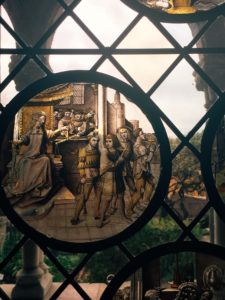 On April 24th and 25th, the History Department sponsored the Medieval England Conference that showcased the research done in the Graduate ProSeminar Course led by Dr. Maryanne Kowaleski. This conference included papers by members of the History Department, as well as the Center for Medieval Studies. Patrick DeBrosse, Rachel Podd, Amanda Racine, and Ron Braasch were the 3 doctoral and master’s students, respectively, that presented their research. See a list of all the presentations, as well as some pictures, below. Continue reading
On April 24th and 25th, the History Department sponsored the Medieval England Conference that showcased the research done in the Graduate ProSeminar Course led by Dr. Maryanne Kowaleski. This conference included papers by members of the History Department, as well as the Center for Medieval Studies. Patrick DeBrosse, Rachel Podd, Amanda Racine, and Ron Braasch were the 3 doctoral and master’s students, respectively, that presented their research. See a list of all the presentations, as well as some pictures, below. Continue reading
Monthly Archives: April 2018
Medieval England Conference Recap
Comments Off on Medieval England Conference Recap
Filed under Department Events, Grad Student News
International Conference on Sustainable Cities
 Fordham, Columbia, and NYU are collaborating for a 2 day conference, interdisciplinary and international, on sustainable cities. For more information and registration, check out Fordham’s page: SUSTAINABLE CITIES CONFERENCE INFORMATION
Fordham, Columbia, and NYU are collaborating for a 2 day conference, interdisciplinary and international, on sustainable cities. For more information and registration, check out Fordham’s page: SUSTAINABLE CITIES CONFERENCE INFORMATION
May 1-2, 2018
Fordham University
Lincoln Center Campus, McNally Amphitheatre
113 West, 60th Street, New York, NY
Comments Off on International Conference on Sustainable Cities
Filed under Uncategorized
Lectures in London… Race and Risorgimento: An Unexplored Chapter?
In spite of the crucial role race played in European nationalisms, it still remains largely absent in the historiography of the Italian Risorgimento. Late eighteenth- and nineteenth-century sources disclose the keen interest paid by Risorgimento nationalists in the history, the culture, the language and even the bodies of the Italians. Against this backdrop, the question of how the search for the “material essence” of Italian-ness shaped and affected the early nineteenth-century debate about the Italian identity becomes imperative.
This and other questions have been discussed and examined by Fordham Ph.D. candidate in modern European history Edoardo M. Barsotti, who was invited to deliver a lecture about his dissertation for the Italian Department Research Seminars at the University College of London, on February 21st 2018.
At the seminar, hosted by Dr. Ferrara Degli Uberti, Edoardo has discussed the extent to which the quest for the “first” Italians, and the question of the permanence and heredity of cultural, psychosocial and physical traits characterized the works of Italian national-patriotic intelligentsia since the Revolutionary age, and how they evolved, and interacted with the surrounding political debate about the future Italian nationhood well into the 1850s and 1860s. In such an outlook, the Risorgimento’s idea of race appears as a multilayered and multifaceted construction in which the contributions of different traditions, ideologies, and disciplines are evident. The resulting ideas of an Italian “race,” or even physical understanding of an Italian “national type,” result, in effect, from the coalescence of several concepts borrowed from the antiquarian tradition, Biblical genealogies, linguistics, philology, and, of course, the natural science of man.
In the concluding remarks of the seminar, the guest lecturer, the discussant, and the public discussed the theoretical and methodological questions concerning the different understandings of race in modern history, as well as their permanence in the public discourse about national identity in contemporary Italy and Europe as well.
Comments Off on Lectures in London… Race and Risorgimento: An Unexplored Chapter?
Filed under Uncategorized
Medieval England Conference at Fordham!
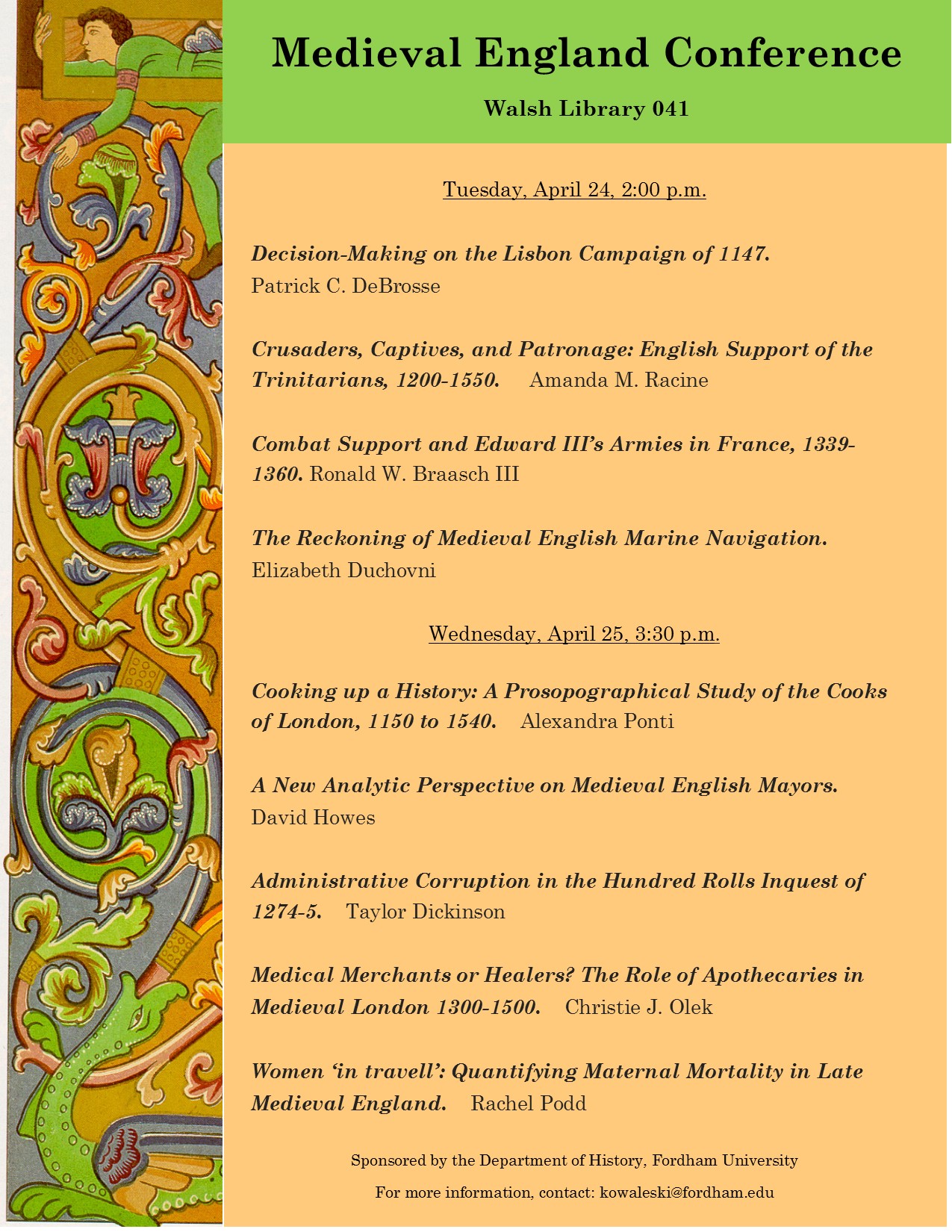
Comments Off on Medieval England Conference at Fordham!
Filed under Department Events, Events, Grad Student News, This week in Fordham History
History Undergrads Present Their Research at the Undergraduate Research Symposium
Three undergraduate History students were chosen to present their research at the 11th Annual Undergraduate Research Symposium on April 11. Dr. Elizabeth Penry, Associate Chair for Undergraduate Studies in the History Department who moderated the panel, reported that the presentations were excellent and that all three were based on extensive original research in primary sources. Here are the abstracts of the papers presented by Josh Anthony, Katherine De Fonzo, and Elizabeth Doty. Continue reading
Comments Off on History Undergrads Present Their Research at the Undergraduate Research Symposium
Filed under Department Events, Events, Undergrad News, Undergraduate Research
O’Connell Initiative Event!

Comments Off on O’Connell Initiative Event!
Filed under Department Events, Events, O'Connell Initiative
Science-Humanities Seminar on May 11th!

Comments Off on Science-Humanities Seminar on May 11th!
Filed under Department Events, Events
A Postcard from Argentina
What do historians do over spring break? Dr. Elizabeth Penry, Associate Chair for Undergraduate Studies, traveled to Argentina for research and sent us this postcard from Buenos Aires.
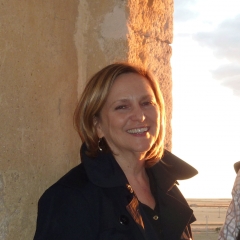
With the support of a generous Faculty Research Grant from Fordham University, I have begun work on a new project on indigenous literacy practices in the colonial Andes (16th – 18th centuries). Over the spring break, I traveled to Buenos Aires to work in the Archivo General de la Nación. The geographic focus of my work is that region of the Andes that became the modern nation of Bolivia. Part of the Inca empire at the time of the Spanish invasion, it formed the southern region of the Viceroyalty of Peru for over 200 years until it was incorporated into the new Viceroyalty of the Rio de la Plata, headquartered in Buenos Aires, at the end of the 18th century.
A 1768 Complaint about Book Burning
Finding information about indigenous literacy is a little like hunting for a needle in a haystack; there isn’t any division in any colonial archive dedicated to the topic. But in addition to 250 years of detailed records of royal orders, the Argentine national archives are particularly rich with census and economic records for the region, and sometimes surprising information turns up. Orders coming from Spain demanded that schools be established in every indigenous town and that native Andeans should learn Spanish, but they rarely provided monetary support. However, I found tax records that list funds paid for indigenous village school teachers. Even more interesting is how many indigenous people were labeled ‘indios ladinos’ the term Spaniards used for natives who were fluent in Spanish language and culture. Indios ladinos were identified as town criers, translators, church sacristans, and frequently were responsible for writing legal petitions for their communities. In one unusual case that I found, an indio ladino accused a priest of being complicit in the burning of books. Although he claimed not know the titles of the destroyed books, this native Andean was horrified by the sight and filed a complaint with officials. All these small details will allow me to create a detailed composite picture of indigenous practices related to literacy in the colonial period.
A 1592 order for a new census following a measles epidemic
A 1611 Census Report
Besides archival work, I met with colleagues at the Universidad de Buenos Aires. The university has a very active program in Andean history and it was great to compare research notes with fellow scholars. Argentine colleagues made my research much easier by sharing their detailed knowledge, as well as catalog records of local archives. Of course, just being in Buenos Aires is wonderful. One of the wealthiest countries in the world at the turn of the 20th century, Argentina, like the US, is a nation of immigrants. In particular, large numbers of Italians (like the family of Pope Francis) came to Buenos Aires, influencing the cuisine and the language. After a day of archival research, it’s hard to choose between a parrillada (grilled meats) or ñoquis (gnocchis) prepared Roman style to go with un buen Malbec. One of the great joys of working on the colonial Andes is the opportunity to work in archives in many different countries, and to have colleagues literally around the globe.
Entrance to Archivo General de la Nación in Beunos Aires
Comments Off on A Postcard from Argentina
Filed under Faculty Awards, Faculty News, Postcards, Uncategorized
Grad Student News
 Jordyn May, a PhD student in the History Department, has her research on the visual culture of the women’s suffrage movement featured on Fordham University’s home page. Check it out: WOMEN’S HISTORY: HOW SUFFRAGETTES SOLD THEIR MESSAGE
Jordyn May, a PhD student in the History Department, has her research on the visual culture of the women’s suffrage movement featured on Fordham University’s home page. Check it out: WOMEN’S HISTORY: HOW SUFFRAGETTES SOLD THEIR MESSAGE
Comments Off on Grad Student News
Filed under Grad Student News
A Roundtable Discussion on Scholarship and Public Engagement

Comments Off on A Roundtable Discussion on Scholarship and Public Engagement
Filed under Department Events, Events, Grad Student News

